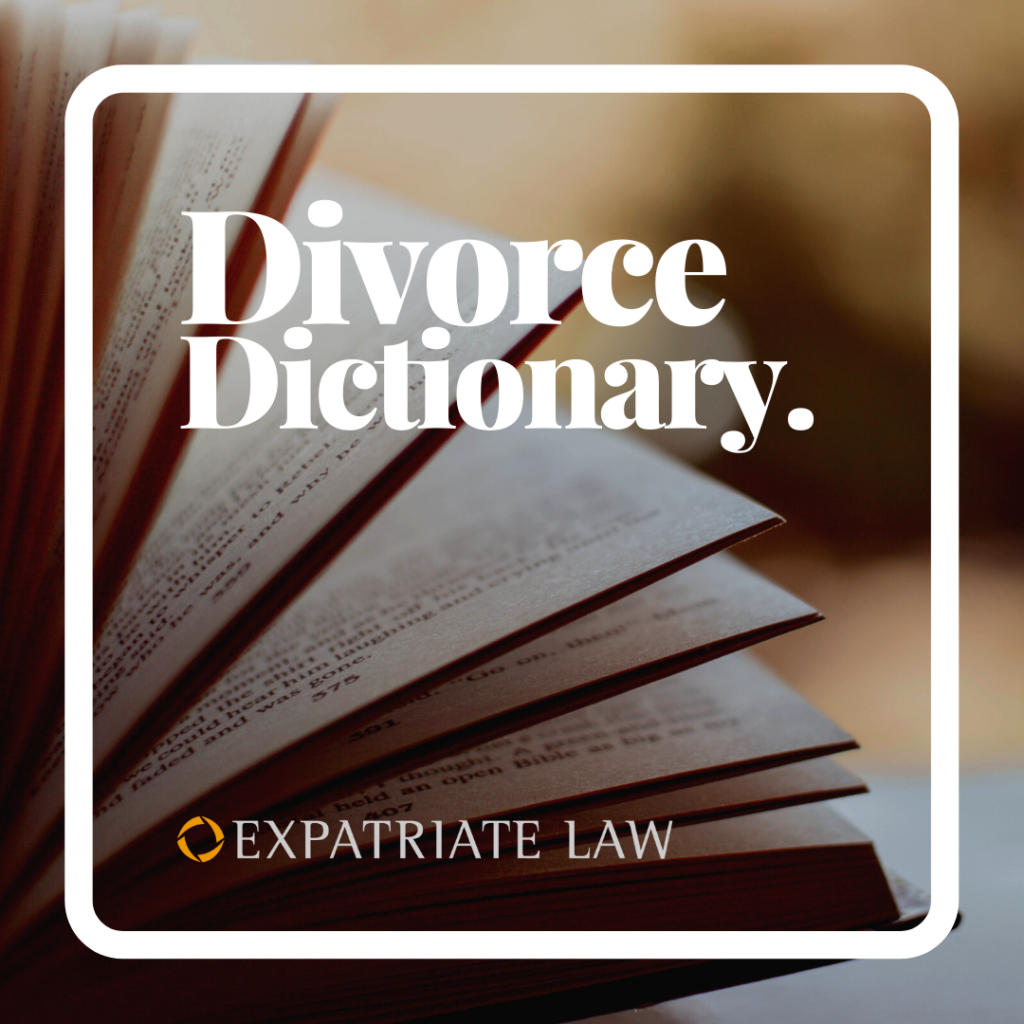Acknowledgment of service
|
A form that the Respondent files at court on receipt of the divorce or dissolution application. |
Applicant
|
The party applying to the court. |
Arbitration
|
An out-of-court method of dispute resolution, whereby an arbitrator is appointed to make a binding decision. |
Barrister
|
A lawyer who chooses to work mostly as a court advocate, usually on instructions from a Solicitor. Compare Solicitor (below), a lawyer who chooses to advise and represent clients directly, most commonly to negotiate agreements and resolve disputes out of court. |
Clean Break
|
Where both parties dismiss present or future family law financial claims against each other. |
Child Arrangements
|
Arrangements for with whom a child is to live, spend time or have contact with another person, and when they are to do so. The arrangements are usually made by agreement, but in the absence of agreement a court can order child arrangements. These can be vague or very specific, for example, dictating what time and where a child is to be picked up by one parent. |
Civil Partnership
|
A legal status in England & Wales for partners who register as civil partners, providing them with similar legal rights to married couples. Since 2019, both same-sex and opposite-sex couples have been able to register a civil partnership in England & Wales. |
Cohabitation
|
Where a couple who is not married or in a civil partnership live together in the same household. |
Collaborative Practice
|
Parties voluntarily exchange information and pledge not to go to court as they work towards a shared resolution. If someone decides to go to court, then all those involved in the collaborative process must withdraw and the parties must appoint new lawyers and start the process from the beginning. |
Consent Order
|
A legal document drawn up when an agreement has been reached, whether in relation to the finances or to the children. A consent order becomes binding and enforceable only once it has been ratified by the court. |
Court Orders
|
Are legally binding and must be complied with otherwise the other party can issue enforcement proceedings and seek costs orders against those who fail to comply with them. |
Dissolution
|
A legal end to a civil partnership. |
Divorce
|
A legal end to a marriage. |
Domicile
|
Domicile of origin is the domicile that everyone acquires at birth. The law of domicile is complex and varies between countries. Under the law of England & Wales, you acquire the domicile of your father if your parents were married and living together at the time of your birth. If your mother was unmarried, or separated from your father, domicile may be unclear without a detailed enquiry into the particular circumstances. A person must always have a domicile and can only have their domicile in one country. After the age of 16, a person can acquire a new domicile by moving to another country and intending to remain there permanently. |
Expatriate
|
A person living outside their native country. On divorce in family law cases expatriates may have a choice of jurisdiction in which the case may proceed. |
Final Order
|
Part 2 of the 2-part divorce process. The Final Order formally dissolves the marriage. Any final financial agreement that has been approved by the court, or any final financial court order made in family law proceedings, becomes binding and enforceable only once the Final Order has been granted. This is currently known as the Decree Absolute, but this will change when the new no fault divorce law comes into effect on 6 April 2022. |
Financial Disclosure
|
In family law proceedings, both parties have a duty to provide full and frank financial disclosure so that they and their advisors and the court can assess the fairness of a proposed financial settlement. This means that both parties must disclose all assets and liabilities in their name, for example properties, bank accounts, investments, and pensions. |
Financial Remedy Proceedings
|
Can be issued by either spouse if no agreement can be reached regarding the matrimonial finances. Issuing proceedings will start a court timetable, but negotiations can take place against that timetable and a settlement may be reached at any time. |
Form E Financial Statement
|
A 27-page court form in which each party lists their assets, liabilities, income and living costs. |
Fixed Fee Scheme
|
Expatriate Law offer fixed fees for an uncontested divorce but fees relating to financial matters are billed separately on your solicitor’s hourly rate. |
Grounds for Divorce
|
There is only one ground for divorce which is that the marriage has irretrievably broken down |
Habitual Residence
|
Jurisdiction for divorce can be based on one’s habitual residence. Habitual residence is defined as the place where the person has established, on a fixed basis, his permanent or habitual centre of interest, for example, the court might look at where your GP is registered or where your children go to school. |
Income Needs
|
The monthly financial needs of both parties and their children. These will need to be calculated during financial negotiations to ensure that both parties have sufficient income to maintain themselves. |
Jurisdiction
|
The territorial extent of the ability of the court to rule on issues related to the parties, their children and their property. It may also be used to refer to a particular legal system, for example “expatriates may have a choice between different jurisdictions for their divorce”. |
Legal Fees
|
These are the costs charged by your solicitors and barrister for assisting you with your matter. |
Legal Services Payment Order
|
An order that a party to litigation must pay for another party’s legal fees before those fees have been incurred., In some circumstances the court can also order the payment of legal fees already incurred. |
Litigation Loans
|
Litigation loans to pay legal fees may be available to those based in the UK and who have assets which can be used as security. |
Matrimonial Pot
|
All assets of the two parties that are theoretically available to be shared on divorce. What is or is not treated as being in the “pot” depends on the laws of the country where the divorce is taking place. |
Mediation
|
Mediators are trained to help resolve disputes over all issues faced by separating couples, or specific issues such as arrangements for any children. Mediators are neutral and will not take sides, so they cannot give advice to either of you. They will usually recommend that you obtain legal advice alongside the mediation process and will guide you as to when this should happen. |
No Fault Divorce
|
A significant change that will come into effect on 6 April 2022 where spouses and civil partners will be able to obtain a divorce or dissolution without having to blame the other party. Please see ‘no fault divorce’ article for further information |
Non-Molestation Order
|
An order prohibiting someone from “molesting” a partner or former partner. Molesting includes using or threatening violence, intimidating, harassing, pestering, contacting, or damaging their property.
|
Occupation Order
|
An order determining who should live in a property, often to the exclusion of the partner or ex-partner. These are often sought in tandem with a non-molestation order |
Part III Claims
|
This is a type of claim that can be made for financial relief in the UK after a divorce has taken place overseas. |
Parental Responsibility
|
The rights, duties, powers, responsibilities, and authority which a parent of a child has in relation to that child. This includes: providing them with a home, choosing their education and agreeing to medical treatment.
|
Pension
|
A fund into which money is added during your working life, and from which payments are drawn to support your retirement from work in the form of periodic payments. Depending on your pension provider, a lump sum may also be taken from this fund before retirement. See also Superannuation. |
Prohibited Steps Order
|
An order preventing a parent from exercising part of their parental responsibility. These commonly include: travel abroad, medical treatment or a change of name. |
Questionnaires
|
Can be sent to a party after they have provided financial disclosure to obtain further information if there are deficiencies in the disclosure. |
Respondent
|
The party responding to the court application. |
Right of Survivorship
|
The right of a joint owner to receive the other’s share of property upon the death of the other owner. |
Severing a Joint Tenancy
|
Will prevent a joint owner automatically receiving your share of a jointly owned property if you die before a final settlement has been reached. |
Specific Issues Order
|
An order to resolve a particular issue relating to a child. For example, the court may make an order regarding a child’s medical treatment or an aspect of their education. |
Spousal Maintenance
|
The amount and duration depend on the legal system in which the divorce is taking place. In English law, relevant factors include the length of the marriage, the parties’ earning capacity, age of the parties and most importantly, income needs. |
Trusts
|
The English family courts have developed a robust attitude to offshore trusts and on occasion may view a trust structure with scepticism, as a means to hide or obscure financial realities behind shams and artificial devices. |
Undertaking
|
A solemn promise someone makes to the court. If an undertaking is breached, then that person will be in contempt of court. |
Validity of an Overseas Marriage
|
In essence, if the marriage satisfies the legal requirements of the country where the wedding ceremony took place then it will be recognised in England & Wales. |
Visas
|
In the UK and many other countries divorce can affect a dependent spouse’s right to reside in the country if she was previously sponsored by the other spouse. Advice must be taken on relevant immigration and visa law if the dependent spouse wishes to remain in the country. |
Wills
|
Pronouncement of decree absolute after a will was made will affect any provision made between former spouses in their wills. Wills should be written or reviewed before a divorce is finalised. |



